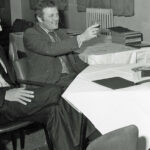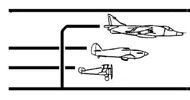| Name: | |
| Michael Frain | |
| Transcript: 8 | |
| Sir Colin Chandler | |
Sir Colin Chandler had joined Hawker Siddeley Aviation Kingston in 1967 as a Commercial Manager and became Director and General Manager in 1977 – the year the company was nationalised and became part of British Aerospace. Michael here describes how Sir Colin earned his respect by trying to get away from excessive focus on the product – the aircraft – to the real issue – making the business profitable. This did not always make him popular in the company but he was prepared to ‘think outside the box’ and to speak his mind. Michael also believes that Sir Colin would have argued within British Aerospace for keeping the Kingston site open. Sir Colin Chandler became the chairmen of the budget airline EasyJet in 2002.Something Colin Chandler said, he came into the mess one day at a meeting. And Colin Chandler was? Sir Colin Chandler was the [Director and] General Manager of the Kingston site. [He later became the Divisional Managing Director of the BAe Kingston-Brough Division]. I had a lot respect for Sir Colin Chandler and knew him relatively well. But he came in and castigated the senior executives because he felt they were all so centred on the aircraft, the product, and not the real issue, was the bottom line profit making. No doubt he’d had a bad day looking at figures when he came up to lunch and spoke to us all. Because the thing was, as well, was that that was a very successful period for the company wasn’t it? The Harrier was in development and of course the Harrier came into its own during the Falklands conflict and at that period, during your time, it would have been sold to the Americans. Which was an enormous coup… It was sold to the Finns – we had a Finland – a very big order and Sir Colin Chandler was heavily involved in that. And we were even involved with Bentalls, the departmental store in Kingston and they helped promote Finnish products. So that was another. And I think it was Sir Colin Chandler was thinking ‘outside the box’ and was well in-tune with what was going on in the outside world. And he related the building of aircraft to Finnish products and wanted to promote, help promote the customers’ requirements. And that’s where the partnership, in some form or another, with Bentalls the departmental store. So what do you think it was that finally did for Kingston because, as I am sure you are aware there’s still quite a lot of feeling amongst ex-employees and indeed some other people that Kingston was ‘got’. That it was, you know, a firm that was producing aircraft which had proved their worth, which had sold around the world. But at the same time it was closed down and production went up to factories in the north, to Brough and Warton and places like that. It was probably politics -it was… I don’t know how well or how far the senior management on the Kingston site were prepared to defend the site and put the best case forward. I know that Sir Colin Chandler – and I think by this time he had moved on to Vickers – he believed that the Kingston site was the profitable site. And I can talk from overhead point of view that we, after many years of introducing identification of core activity, of whole life cycle -in other words ‘cradle to grave’ maintenance and ownership – that we were starting to get that business into a more modern ‘ship- shape’ business. And Sir Colin Chandler, as far as I am aware, was firmly of the belief that the Kingston factory site should be kept open and because of the profitability. And we were moving forward. So much so, and it’s only hearsay, but on the closing dinner for the senior executives and people that were invited that had been associated in the past with the Kingston site, Sir Colin Chandler was the only one not invited. And I maintain to this day that it was because of his opposition to the closure of the site. Now, I could be wrong but that was the feeling I got. So there was a closing dinner. And Colin Chandler was not invited to that? As far as I’m aware – he didn’t appear. What do you think the reason for that was? I think they perhaps thought he would speak out about the situation – he would be critical. And because he was a man that had a lot of, we all had, most of the senior executives had a lot of respect for him simply because he would speak his mind. I don’t think the management that were part of the decision to make the closure would want him there. Because they wanted it – although to some of us that were losing our jobs and the work that we put in – in my case for twenty years or more – we were losing that. And it had become more than just a job because it had brought a factory that was steeped in history; we brought it more into the modern era. And in fact, I can tell you that we got accolades. My own team got accolades for the high level of success and telling us that we were in the top ten percent of industrial businesses in the country – the way we were running it.
|
|



